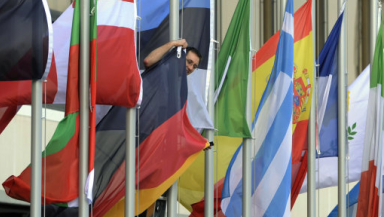
Two cases that could lead to a pan-European legal right to same-sex marriage are being fought by the European Centre for Law and Justice (ECLJ).
The challenge from the ECLJ comes after the European Court of Human Rights (ECHR) decided last December to hear two sets of cases from Italy that both argue that gay marriage is a human right.
One group of cases, 'Oliari and A vs Italy' and 'Gian Mario Felicetti and others vs Italy', argues that Italian legislation denying same-sex couples the right to enter into either marriage or any other type of civil union amounts to discrimination.
The other case, 'Francesca Orlandi and others vs Italy', argues the same basic principle but comes from the perspective that the Italian government, by refusing to recognise same-sex marriages conducted abroad, is being unfairly discriminatory.
As well as using the anti-discrimination clause of the European Convention on Human Rights found in Article 14, both cases are also invoking Article 8 which protects private and family life, and Article 12 which guarantees the right to marry and fund a family.
Previous ECHR judgements have declared that the court does not believe same-sex marriage to be a right.
One example of this was the case of 'Gas and Dubois vs France' in 2012, in which a lesbian couple failed to convince the ECHR that they were being discriminated against by being denied the right to adopt because they were not married.
At that time, the court's judgement declared: "The European Convention on Human Rights does not require member states' governments to grant same-sex couples access to marriage."
Other judgements, like in the case of 'Schalk and Kopf vs Austria in 2004', have previously settled the question of Article 12's relation to marriage.
In that case, the ECHR decided that it was acceptable to rule that the "men and women" referred to in Article 12 could be considered to mean that men and women may only be allowed to marry each other. It did not prescribe a particular interpretation, but said that a traditionalist understanding of marriage was acceptable.
The ECLJ fears that in considering the Italian cases, the European Court of Human Rights may create a new legal duty for European Union Member States to allow gay marriage.
They point to the possibility that the ECHR may require states to "recognize the relationship" of couples without discrimination on the grounds of sexual orientation.
In the case of 'Vallianatos and others vs Greece' in 2009, the ECHR ruled that "same-sex couples are just as capable as different-sex couples of entering into stable committed relationships" and therefore ruled that "having their relationship officially recognised by the State" was part of a same-sex couple's private and family life protected by Article 8.
In that case, the court ruled that governments "must necessarily take into account developments in society and changes in the perception of social and civil-status issues and relationships, including the fact that there is not just one way or one choice when it comes to leading one's family or private life".
However, the case related to the provision of civil partnerships, which were offered to heterosexual couples, but not same-sex couples. The Italian cases differ in that they pertain specifically to marriage.
If these cases result in a judgement similar to the 2009 Greek case, it could create an expectation or requirement that all other states sign up to the European Convention on Human Rights and recognise same-sex marriage.
Despite the recent passage of the EU's "Road-map against Homophobia" guidelines in the European Parliament, many of the ECHR's judges do not accept definitions of marriage and family that allow for same-sex marriage.
Several judges still support the original definitions outlined in the Universal Declaration of Human Rights, which define family as "the natural and fundamental group unit of society", and "[the] natural environment for the growth and wellbeing of all its member and particularly children".
The ECLJ argues that these definitions support the view that: "The existence, or potential existence, of children is the only reason why married couples and families are recognised and supported by the state."
The first public hearing on the case is expected to be held in May and a final judgement heard before the end of the year.













